Analysis of Global Health Policy: Medicine Availability & Trade
VerifiedAdded on 2022/08/13
|11
|2893
|16
Essay
AI Summary
This essay undertakes an in-depth analysis of the critical global health challenge stemming from the limited availability of essential medicines and services, which is primarily attributed to the influence of trade agreements and the actions of pharmaceutical corporations. The essay examines the interplay between globalization, trade agreements, and intellectual property rights, highlighting how these factors impact the accessibility and affordability of vital medications. It critiques the practices of pharmaceutical corporations, emphasizing their focus on economic gains and the resulting exploitation of trade agreements. The paper identifies key actors in this global health issue, including pharmaceutical corporations, national governments, the World Health Organization (WHO), and non-profit organizations, while also exploring the roles and responsibilities of each entity. Finally, the essay proposes potential solutions, such as revising trade agreements, encouraging a shift in the priorities of pharmaceutical corporations towards the common good, and fostering collaborations between governments, WHO, and pharmaceutical companies to regulate medicine distribution and pricing. The ultimate goal is to improve medicine access and address this important global health challenge.
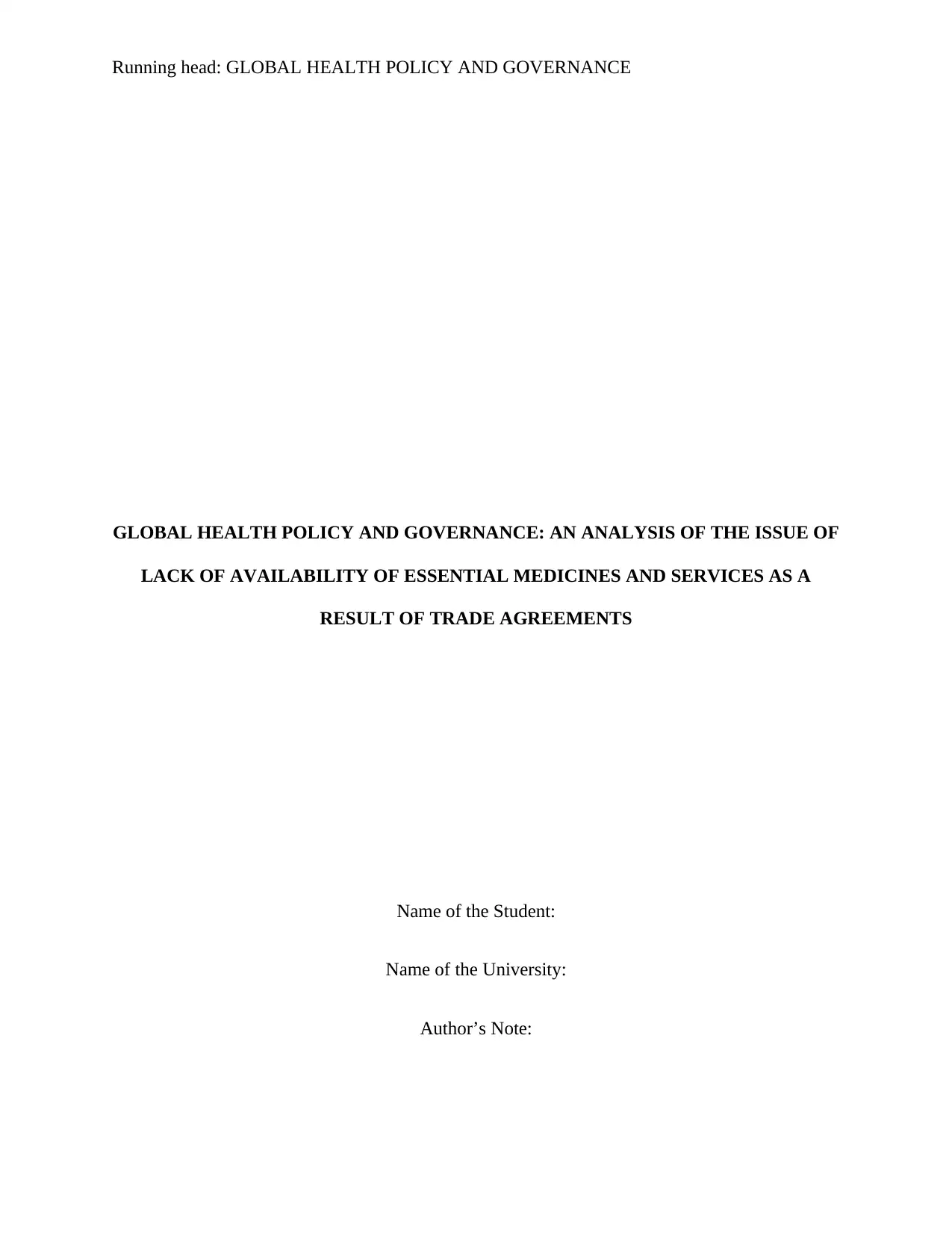
Running head: GLOBAL HEALTH POLICY AND GOVERNANCE
GLOBAL HEALTH POLICY AND GOVERNANCE: AN ANALYSIS OF THE ISSUE OF
LACK OF AVAILABILITY OF ESSENTIAL MEDICINES AND SERVICES AS A
RESULT OF TRADE AGREEMENTS
Name of the Student:
Name of the University:
Author’s Note:
GLOBAL HEALTH POLICY AND GOVERNANCE: AN ANALYSIS OF THE ISSUE OF
LACK OF AVAILABILITY OF ESSENTIAL MEDICINES AND SERVICES AS A
RESULT OF TRADE AGREEMENTS
Name of the Student:
Name of the University:
Author’s Note:
Paraphrase This Document
Need a fresh take? Get an instant paraphrase of this document with our AI Paraphraser
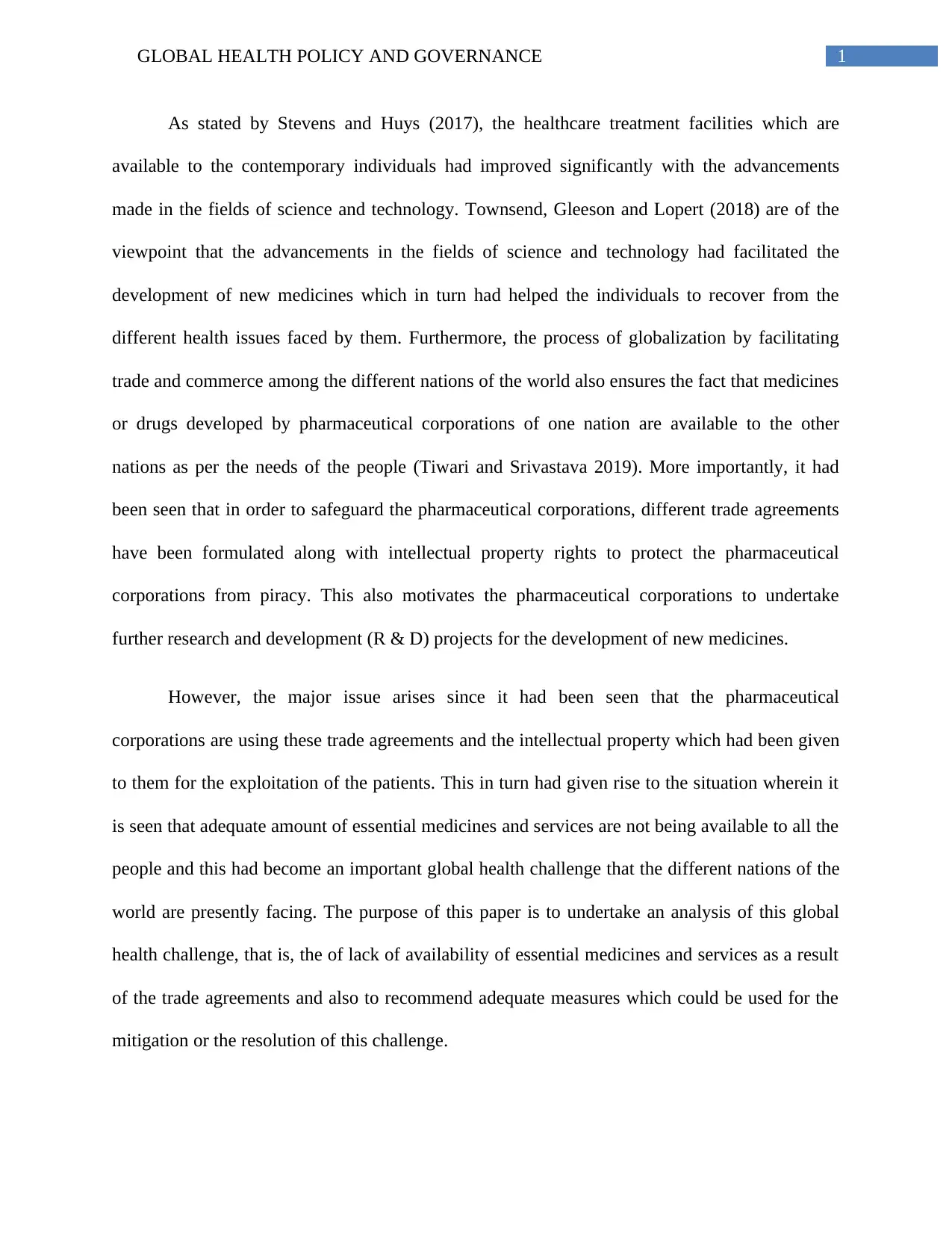
1GLOBAL HEALTH POLICY AND GOVERNANCE
As stated by Stevens and Huys (2017), the healthcare treatment facilities which are
available to the contemporary individuals had improved significantly with the advancements
made in the fields of science and technology. Townsend, Gleeson and Lopert (2018) are of the
viewpoint that the advancements in the fields of science and technology had facilitated the
development of new medicines which in turn had helped the individuals to recover from the
different health issues faced by them. Furthermore, the process of globalization by facilitating
trade and commerce among the different nations of the world also ensures the fact that medicines
or drugs developed by pharmaceutical corporations of one nation are available to the other
nations as per the needs of the people (Tiwari and Srivastava 2019). More importantly, it had
been seen that in order to safeguard the pharmaceutical corporations, different trade agreements
have been formulated along with intellectual property rights to protect the pharmaceutical
corporations from piracy. This also motivates the pharmaceutical corporations to undertake
further research and development (R & D) projects for the development of new medicines.
However, the major issue arises since it had been seen that the pharmaceutical
corporations are using these trade agreements and the intellectual property which had been given
to them for the exploitation of the patients. This in turn had given rise to the situation wherein it
is seen that adequate amount of essential medicines and services are not being available to all the
people and this had become an important global health challenge that the different nations of the
world are presently facing. The purpose of this paper is to undertake an analysis of this global
health challenge, that is, the of lack of availability of essential medicines and services as a result
of the trade agreements and also to recommend adequate measures which could be used for the
mitigation or the resolution of this challenge.
As stated by Stevens and Huys (2017), the healthcare treatment facilities which are
available to the contemporary individuals had improved significantly with the advancements
made in the fields of science and technology. Townsend, Gleeson and Lopert (2018) are of the
viewpoint that the advancements in the fields of science and technology had facilitated the
development of new medicines which in turn had helped the individuals to recover from the
different health issues faced by them. Furthermore, the process of globalization by facilitating
trade and commerce among the different nations of the world also ensures the fact that medicines
or drugs developed by pharmaceutical corporations of one nation are available to the other
nations as per the needs of the people (Tiwari and Srivastava 2019). More importantly, it had
been seen that in order to safeguard the pharmaceutical corporations, different trade agreements
have been formulated along with intellectual property rights to protect the pharmaceutical
corporations from piracy. This also motivates the pharmaceutical corporations to undertake
further research and development (R & D) projects for the development of new medicines.
However, the major issue arises since it had been seen that the pharmaceutical
corporations are using these trade agreements and the intellectual property which had been given
to them for the exploitation of the patients. This in turn had given rise to the situation wherein it
is seen that adequate amount of essential medicines and services are not being available to all the
people and this had become an important global health challenge that the different nations of the
world are presently facing. The purpose of this paper is to undertake an analysis of this global
health challenge, that is, the of lack of availability of essential medicines and services as a result
of the trade agreements and also to recommend adequate measures which could be used for the
mitigation or the resolution of this challenge.
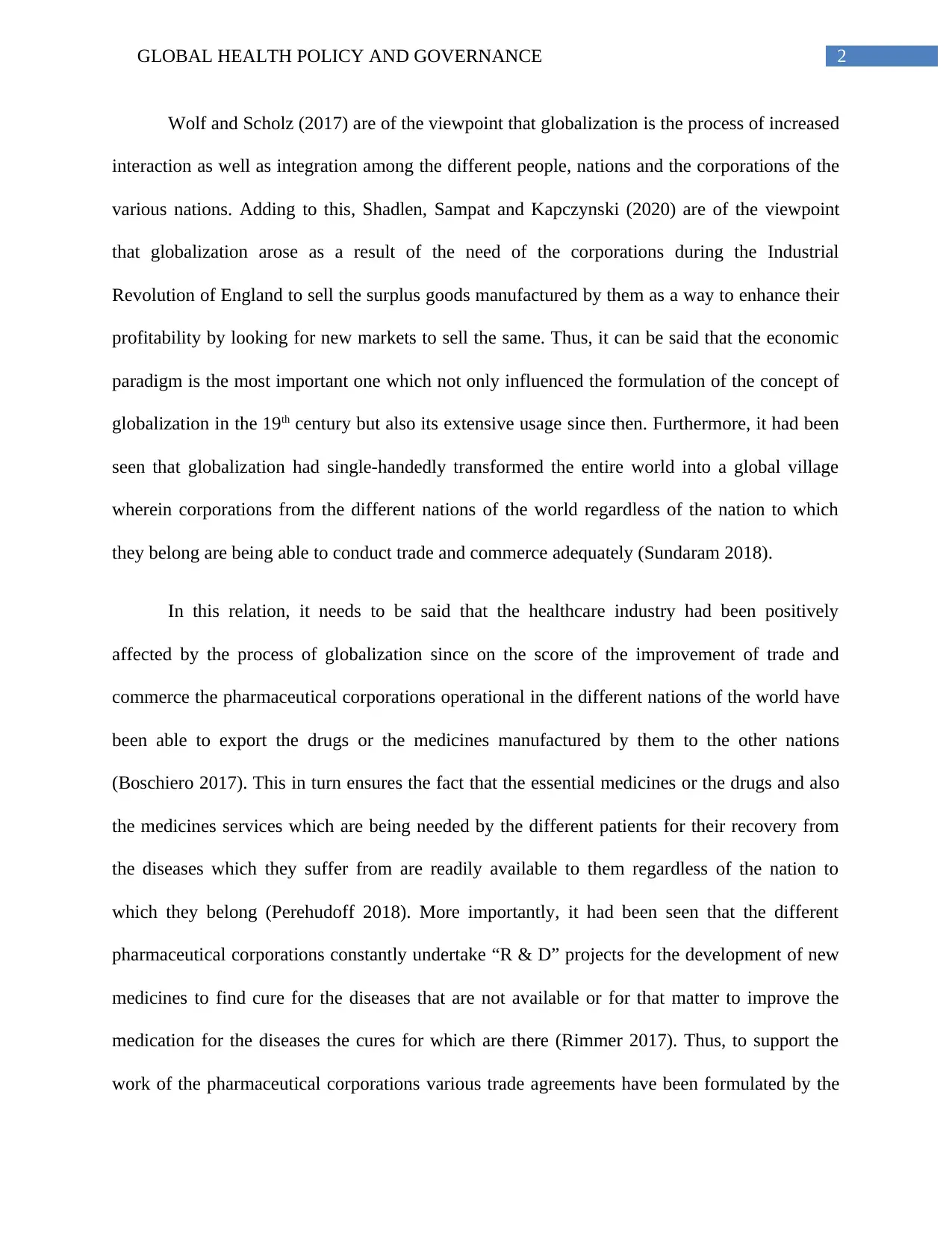
2GLOBAL HEALTH POLICY AND GOVERNANCE
Wolf and Scholz (2017) are of the viewpoint that globalization is the process of increased
interaction as well as integration among the different people, nations and the corporations of the
various nations. Adding to this, Shadlen, Sampat and Kapczynski (2020) are of the viewpoint
that globalization arose as a result of the need of the corporations during the Industrial
Revolution of England to sell the surplus goods manufactured by them as a way to enhance their
profitability by looking for new markets to sell the same. Thus, it can be said that the economic
paradigm is the most important one which not only influenced the formulation of the concept of
globalization in the 19th century but also its extensive usage since then. Furthermore, it had been
seen that globalization had single-handedly transformed the entire world into a global village
wherein corporations from the different nations of the world regardless of the nation to which
they belong are being able to conduct trade and commerce adequately (Sundaram 2018).
In this relation, it needs to be said that the healthcare industry had been positively
affected by the process of globalization since on the score of the improvement of trade and
commerce the pharmaceutical corporations operational in the different nations of the world have
been able to export the drugs or the medicines manufactured by them to the other nations
(Boschiero 2017). This in turn ensures the fact that the essential medicines or the drugs and also
the medicines services which are being needed by the different patients for their recovery from
the diseases which they suffer from are readily available to them regardless of the nation to
which they belong (Perehudoff 2018). More importantly, it had been seen that the different
pharmaceutical corporations constantly undertake “R & D” projects for the development of new
medicines to find cure for the diseases that are not available or for that matter to improve the
medication for the diseases the cures for which are there (Rimmer 2017). Thus, to support the
work of the pharmaceutical corporations various trade agreements have been formulated by the
Wolf and Scholz (2017) are of the viewpoint that globalization is the process of increased
interaction as well as integration among the different people, nations and the corporations of the
various nations. Adding to this, Shadlen, Sampat and Kapczynski (2020) are of the viewpoint
that globalization arose as a result of the need of the corporations during the Industrial
Revolution of England to sell the surplus goods manufactured by them as a way to enhance their
profitability by looking for new markets to sell the same. Thus, it can be said that the economic
paradigm is the most important one which not only influenced the formulation of the concept of
globalization in the 19th century but also its extensive usage since then. Furthermore, it had been
seen that globalization had single-handedly transformed the entire world into a global village
wherein corporations from the different nations of the world regardless of the nation to which
they belong are being able to conduct trade and commerce adequately (Sundaram 2018).
In this relation, it needs to be said that the healthcare industry had been positively
affected by the process of globalization since on the score of the improvement of trade and
commerce the pharmaceutical corporations operational in the different nations of the world have
been able to export the drugs or the medicines manufactured by them to the other nations
(Boschiero 2017). This in turn ensures the fact that the essential medicines or the drugs and also
the medicines services which are being needed by the different patients for their recovery from
the diseases which they suffer from are readily available to them regardless of the nation to
which they belong (Perehudoff 2018). More importantly, it had been seen that the different
pharmaceutical corporations constantly undertake “R & D” projects for the development of new
medicines to find cure for the diseases that are not available or for that matter to improve the
medication for the diseases the cures for which are there (Rimmer 2017). Thus, to support the
work of the pharmaceutical corporations various trade agreements have been formulated by the
⊘ This is a preview!⊘
Do you want full access?
Subscribe today to unlock all pages.

Trusted by 1+ million students worldwide
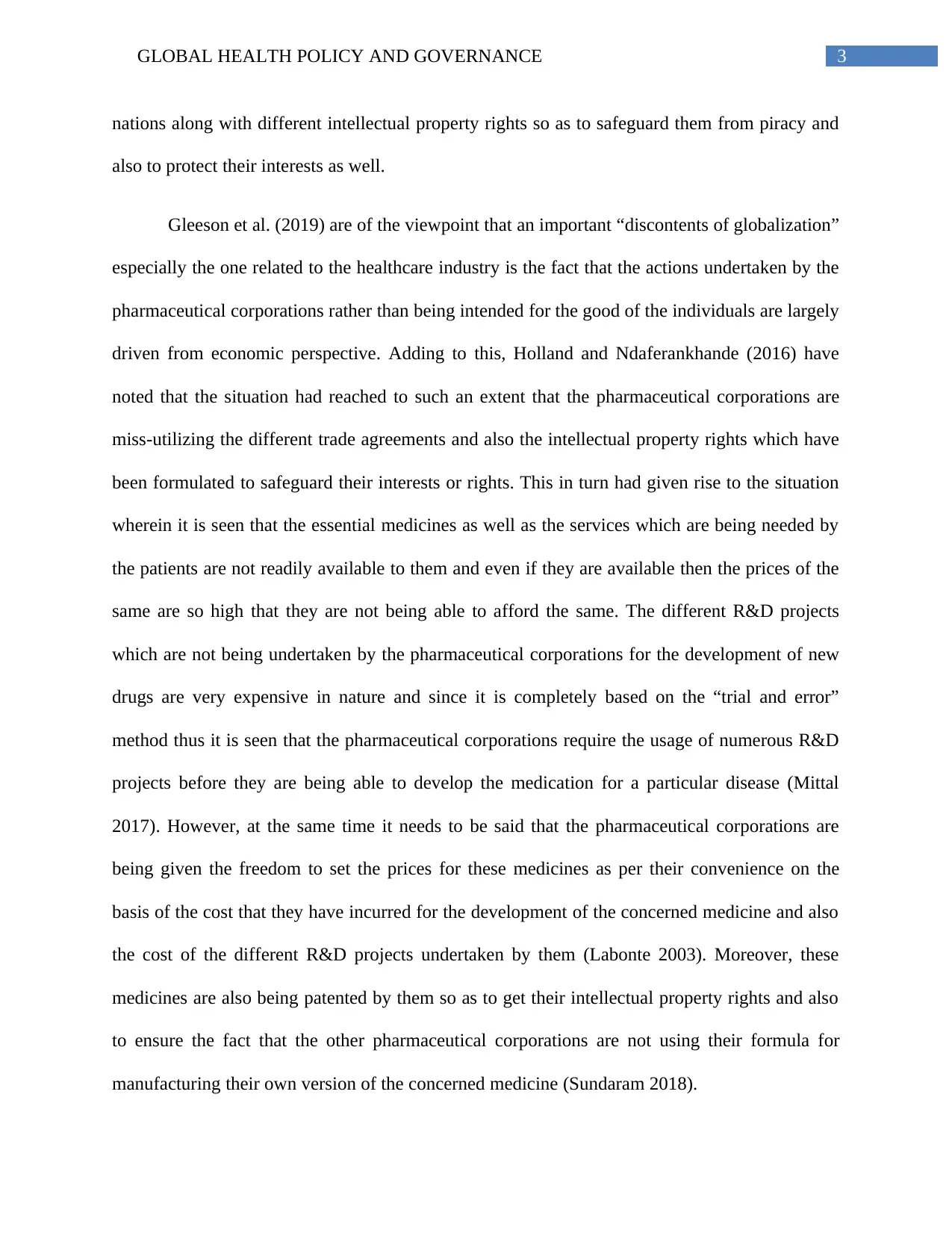
3GLOBAL HEALTH POLICY AND GOVERNANCE
nations along with different intellectual property rights so as to safeguard them from piracy and
also to protect their interests as well.
Gleeson et al. (2019) are of the viewpoint that an important “discontents of globalization”
especially the one related to the healthcare industry is the fact that the actions undertaken by the
pharmaceutical corporations rather than being intended for the good of the individuals are largely
driven from economic perspective. Adding to this, Holland and Ndaferankhande (2016) have
noted that the situation had reached to such an extent that the pharmaceutical corporations are
miss-utilizing the different trade agreements and also the intellectual property rights which have
been formulated to safeguard their interests or rights. This in turn had given rise to the situation
wherein it is seen that the essential medicines as well as the services which are being needed by
the patients are not readily available to them and even if they are available then the prices of the
same are so high that they are not being able to afford the same. The different R&D projects
which are not being undertaken by the pharmaceutical corporations for the development of new
drugs are very expensive in nature and since it is completely based on the “trial and error”
method thus it is seen that the pharmaceutical corporations require the usage of numerous R&D
projects before they are being able to develop the medication for a particular disease (Mittal
2017). However, at the same time it needs to be said that the pharmaceutical corporations are
being given the freedom to set the prices for these medicines as per their convenience on the
basis of the cost that they have incurred for the development of the concerned medicine and also
the cost of the different R&D projects undertaken by them (Labonte 2003). Moreover, these
medicines are also being patented by them so as to get their intellectual property rights and also
to ensure the fact that the other pharmaceutical corporations are not using their formula for
manufacturing their own version of the concerned medicine (Sundaram 2018).
nations along with different intellectual property rights so as to safeguard them from piracy and
also to protect their interests as well.
Gleeson et al. (2019) are of the viewpoint that an important “discontents of globalization”
especially the one related to the healthcare industry is the fact that the actions undertaken by the
pharmaceutical corporations rather than being intended for the good of the individuals are largely
driven from economic perspective. Adding to this, Holland and Ndaferankhande (2016) have
noted that the situation had reached to such an extent that the pharmaceutical corporations are
miss-utilizing the different trade agreements and also the intellectual property rights which have
been formulated to safeguard their interests or rights. This in turn had given rise to the situation
wherein it is seen that the essential medicines as well as the services which are being needed by
the patients are not readily available to them and even if they are available then the prices of the
same are so high that they are not being able to afford the same. The different R&D projects
which are not being undertaken by the pharmaceutical corporations for the development of new
drugs are very expensive in nature and since it is completely based on the “trial and error”
method thus it is seen that the pharmaceutical corporations require the usage of numerous R&D
projects before they are being able to develop the medication for a particular disease (Mittal
2017). However, at the same time it needs to be said that the pharmaceutical corporations are
being given the freedom to set the prices for these medicines as per their convenience on the
basis of the cost that they have incurred for the development of the concerned medicine and also
the cost of the different R&D projects undertaken by them (Labonte 2003). Moreover, these
medicines are also being patented by them so as to get their intellectual property rights and also
to ensure the fact that the other pharmaceutical corporations are not using their formula for
manufacturing their own version of the concerned medicine (Sundaram 2018).
Paraphrase This Document
Need a fresh take? Get an instant paraphrase of this document with our AI Paraphraser
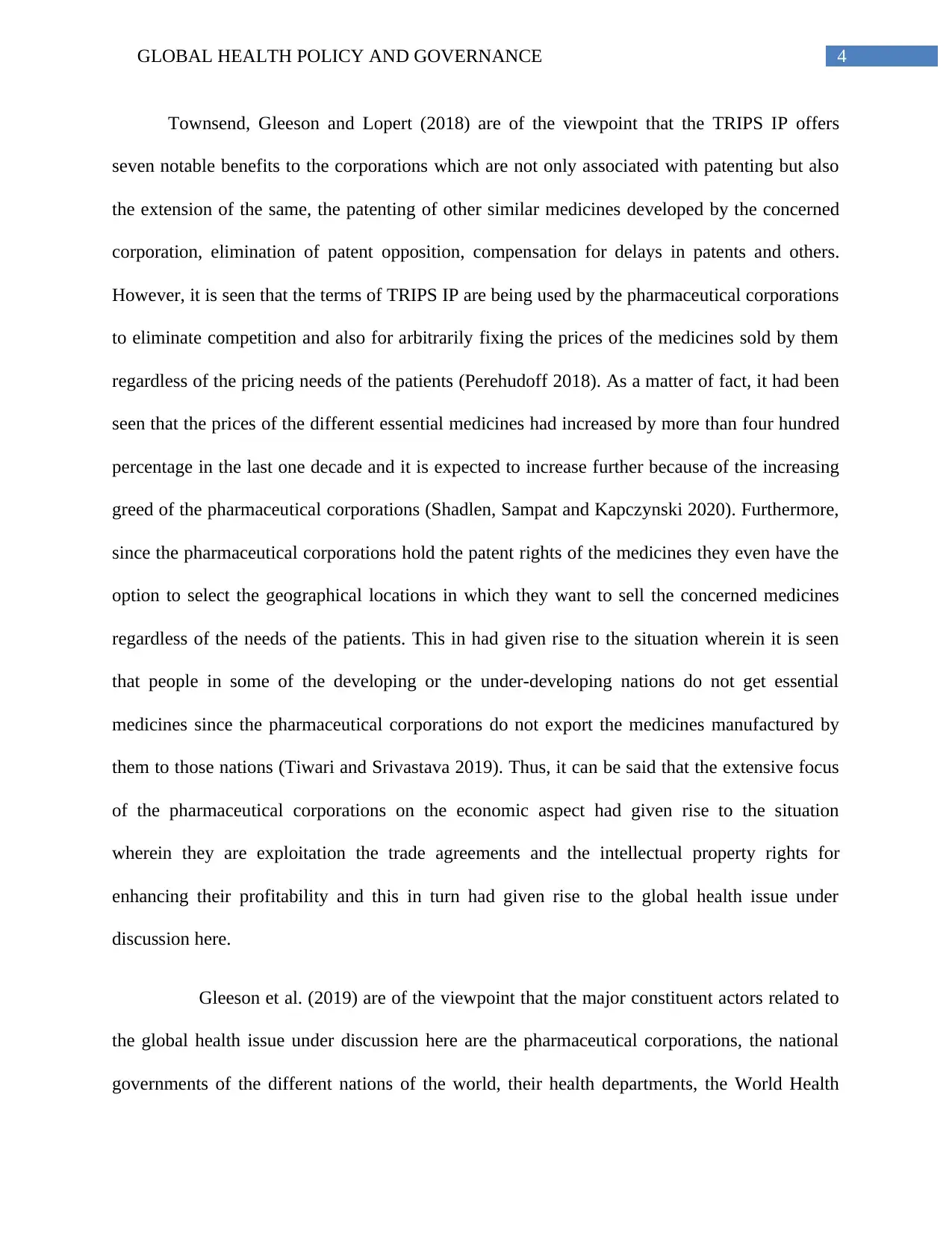
4GLOBAL HEALTH POLICY AND GOVERNANCE
Townsend, Gleeson and Lopert (2018) are of the viewpoint that the TRIPS IP offers
seven notable benefits to the corporations which are not only associated with patenting but also
the extension of the same, the patenting of other similar medicines developed by the concerned
corporation, elimination of patent opposition, compensation for delays in patents and others.
However, it is seen that the terms of TRIPS IP are being used by the pharmaceutical corporations
to eliminate competition and also for arbitrarily fixing the prices of the medicines sold by them
regardless of the pricing needs of the patients (Perehudoff 2018). As a matter of fact, it had been
seen that the prices of the different essential medicines had increased by more than four hundred
percentage in the last one decade and it is expected to increase further because of the increasing
greed of the pharmaceutical corporations (Shadlen, Sampat and Kapczynski 2020). Furthermore,
since the pharmaceutical corporations hold the patent rights of the medicines they even have the
option to select the geographical locations in which they want to sell the concerned medicines
regardless of the needs of the patients. This in had given rise to the situation wherein it is seen
that people in some of the developing or the under-developing nations do not get essential
medicines since the pharmaceutical corporations do not export the medicines manufactured by
them to those nations (Tiwari and Srivastava 2019). Thus, it can be said that the extensive focus
of the pharmaceutical corporations on the economic aspect had given rise to the situation
wherein they are exploitation the trade agreements and the intellectual property rights for
enhancing their profitability and this in turn had given rise to the global health issue under
discussion here.
Gleeson et al. (2019) are of the viewpoint that the major constituent actors related to
the global health issue under discussion here are the pharmaceutical corporations, the national
governments of the different nations of the world, their health departments, the World Health
Townsend, Gleeson and Lopert (2018) are of the viewpoint that the TRIPS IP offers
seven notable benefits to the corporations which are not only associated with patenting but also
the extension of the same, the patenting of other similar medicines developed by the concerned
corporation, elimination of patent opposition, compensation for delays in patents and others.
However, it is seen that the terms of TRIPS IP are being used by the pharmaceutical corporations
to eliminate competition and also for arbitrarily fixing the prices of the medicines sold by them
regardless of the pricing needs of the patients (Perehudoff 2018). As a matter of fact, it had been
seen that the prices of the different essential medicines had increased by more than four hundred
percentage in the last one decade and it is expected to increase further because of the increasing
greed of the pharmaceutical corporations (Shadlen, Sampat and Kapczynski 2020). Furthermore,
since the pharmaceutical corporations hold the patent rights of the medicines they even have the
option to select the geographical locations in which they want to sell the concerned medicines
regardless of the needs of the patients. This in had given rise to the situation wherein it is seen
that people in some of the developing or the under-developing nations do not get essential
medicines since the pharmaceutical corporations do not export the medicines manufactured by
them to those nations (Tiwari and Srivastava 2019). Thus, it can be said that the extensive focus
of the pharmaceutical corporations on the economic aspect had given rise to the situation
wherein they are exploitation the trade agreements and the intellectual property rights for
enhancing their profitability and this in turn had given rise to the global health issue under
discussion here.
Gleeson et al. (2019) are of the viewpoint that the major constituent actors related to
the global health issue under discussion here are the pharmaceutical corporations, the national
governments of the different nations of the world, their health departments, the World Health
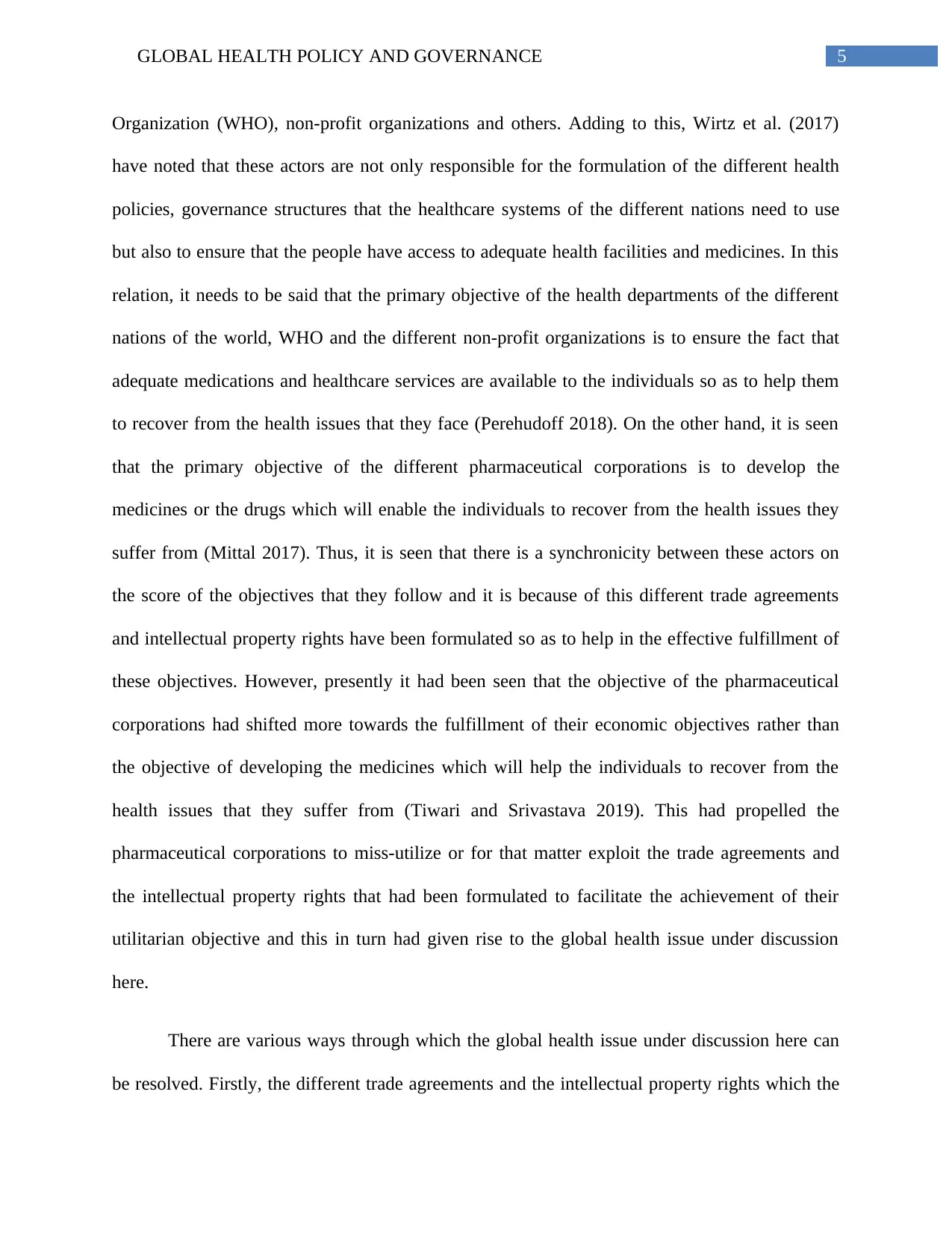
5GLOBAL HEALTH POLICY AND GOVERNANCE
Organization (WHO), non-profit organizations and others. Adding to this, Wirtz et al. (2017)
have noted that these actors are not only responsible for the formulation of the different health
policies, governance structures that the healthcare systems of the different nations need to use
but also to ensure that the people have access to adequate health facilities and medicines. In this
relation, it needs to be said that the primary objective of the health departments of the different
nations of the world, WHO and the different non-profit organizations is to ensure the fact that
adequate medications and healthcare services are available to the individuals so as to help them
to recover from the health issues that they face (Perehudoff 2018). On the other hand, it is seen
that the primary objective of the different pharmaceutical corporations is to develop the
medicines or the drugs which will enable the individuals to recover from the health issues they
suffer from (Mittal 2017). Thus, it is seen that there is a synchronicity between these actors on
the score of the objectives that they follow and it is because of this different trade agreements
and intellectual property rights have been formulated so as to help in the effective fulfillment of
these objectives. However, presently it had been seen that the objective of the pharmaceutical
corporations had shifted more towards the fulfillment of their economic objectives rather than
the objective of developing the medicines which will help the individuals to recover from the
health issues that they suffer from (Tiwari and Srivastava 2019). This had propelled the
pharmaceutical corporations to miss-utilize or for that matter exploit the trade agreements and
the intellectual property rights that had been formulated to facilitate the achievement of their
utilitarian objective and this in turn had given rise to the global health issue under discussion
here.
There are various ways through which the global health issue under discussion here can
be resolved. Firstly, the different trade agreements and the intellectual property rights which the
Organization (WHO), non-profit organizations and others. Adding to this, Wirtz et al. (2017)
have noted that these actors are not only responsible for the formulation of the different health
policies, governance structures that the healthcare systems of the different nations need to use
but also to ensure that the people have access to adequate health facilities and medicines. In this
relation, it needs to be said that the primary objective of the health departments of the different
nations of the world, WHO and the different non-profit organizations is to ensure the fact that
adequate medications and healthcare services are available to the individuals so as to help them
to recover from the health issues that they face (Perehudoff 2018). On the other hand, it is seen
that the primary objective of the different pharmaceutical corporations is to develop the
medicines or the drugs which will enable the individuals to recover from the health issues they
suffer from (Mittal 2017). Thus, it is seen that there is a synchronicity between these actors on
the score of the objectives that they follow and it is because of this different trade agreements
and intellectual property rights have been formulated so as to help in the effective fulfillment of
these objectives. However, presently it had been seen that the objective of the pharmaceutical
corporations had shifted more towards the fulfillment of their economic objectives rather than
the objective of developing the medicines which will help the individuals to recover from the
health issues that they suffer from (Tiwari and Srivastava 2019). This had propelled the
pharmaceutical corporations to miss-utilize or for that matter exploit the trade agreements and
the intellectual property rights that had been formulated to facilitate the achievement of their
utilitarian objective and this in turn had given rise to the global health issue under discussion
here.
There are various ways through which the global health issue under discussion here can
be resolved. Firstly, the different trade agreements and the intellectual property rights which the
⊘ This is a preview!⊘
Do you want full access?
Subscribe today to unlock all pages.

Trusted by 1+ million students worldwide
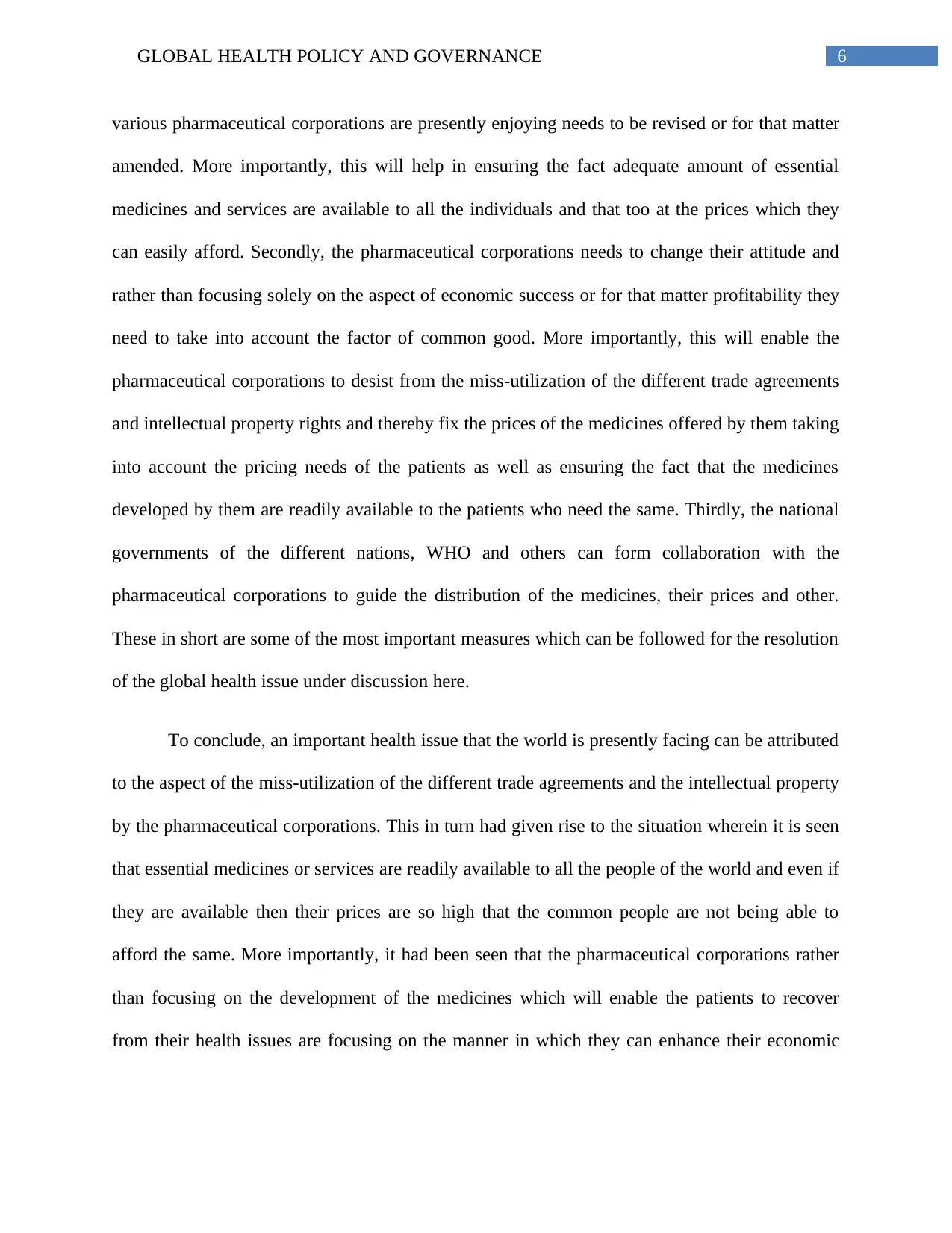
6GLOBAL HEALTH POLICY AND GOVERNANCE
various pharmaceutical corporations are presently enjoying needs to be revised or for that matter
amended. More importantly, this will help in ensuring the fact adequate amount of essential
medicines and services are available to all the individuals and that too at the prices which they
can easily afford. Secondly, the pharmaceutical corporations needs to change their attitude and
rather than focusing solely on the aspect of economic success or for that matter profitability they
need to take into account the factor of common good. More importantly, this will enable the
pharmaceutical corporations to desist from the miss-utilization of the different trade agreements
and intellectual property rights and thereby fix the prices of the medicines offered by them taking
into account the pricing needs of the patients as well as ensuring the fact that the medicines
developed by them are readily available to the patients who need the same. Thirdly, the national
governments of the different nations, WHO and others can form collaboration with the
pharmaceutical corporations to guide the distribution of the medicines, their prices and other.
These in short are some of the most important measures which can be followed for the resolution
of the global health issue under discussion here.
To conclude, an important health issue that the world is presently facing can be attributed
to the aspect of the miss-utilization of the different trade agreements and the intellectual property
by the pharmaceutical corporations. This in turn had given rise to the situation wherein it is seen
that essential medicines or services are readily available to all the people of the world and even if
they are available then their prices are so high that the common people are not being able to
afford the same. More importantly, it had been seen that the pharmaceutical corporations rather
than focusing on the development of the medicines which will enable the patients to recover
from their health issues are focusing on the manner in which they can enhance their economic
various pharmaceutical corporations are presently enjoying needs to be revised or for that matter
amended. More importantly, this will help in ensuring the fact adequate amount of essential
medicines and services are available to all the individuals and that too at the prices which they
can easily afford. Secondly, the pharmaceutical corporations needs to change their attitude and
rather than focusing solely on the aspect of economic success or for that matter profitability they
need to take into account the factor of common good. More importantly, this will enable the
pharmaceutical corporations to desist from the miss-utilization of the different trade agreements
and intellectual property rights and thereby fix the prices of the medicines offered by them taking
into account the pricing needs of the patients as well as ensuring the fact that the medicines
developed by them are readily available to the patients who need the same. Thirdly, the national
governments of the different nations, WHO and others can form collaboration with the
pharmaceutical corporations to guide the distribution of the medicines, their prices and other.
These in short are some of the most important measures which can be followed for the resolution
of the global health issue under discussion here.
To conclude, an important health issue that the world is presently facing can be attributed
to the aspect of the miss-utilization of the different trade agreements and the intellectual property
by the pharmaceutical corporations. This in turn had given rise to the situation wherein it is seen
that essential medicines or services are readily available to all the people of the world and even if
they are available then their prices are so high that the common people are not being able to
afford the same. More importantly, it had been seen that the pharmaceutical corporations rather
than focusing on the development of the medicines which will enable the patients to recover
from their health issues are focusing on the manner in which they can enhance their economic
Paraphrase This Document
Need a fresh take? Get an instant paraphrase of this document with our AI Paraphraser
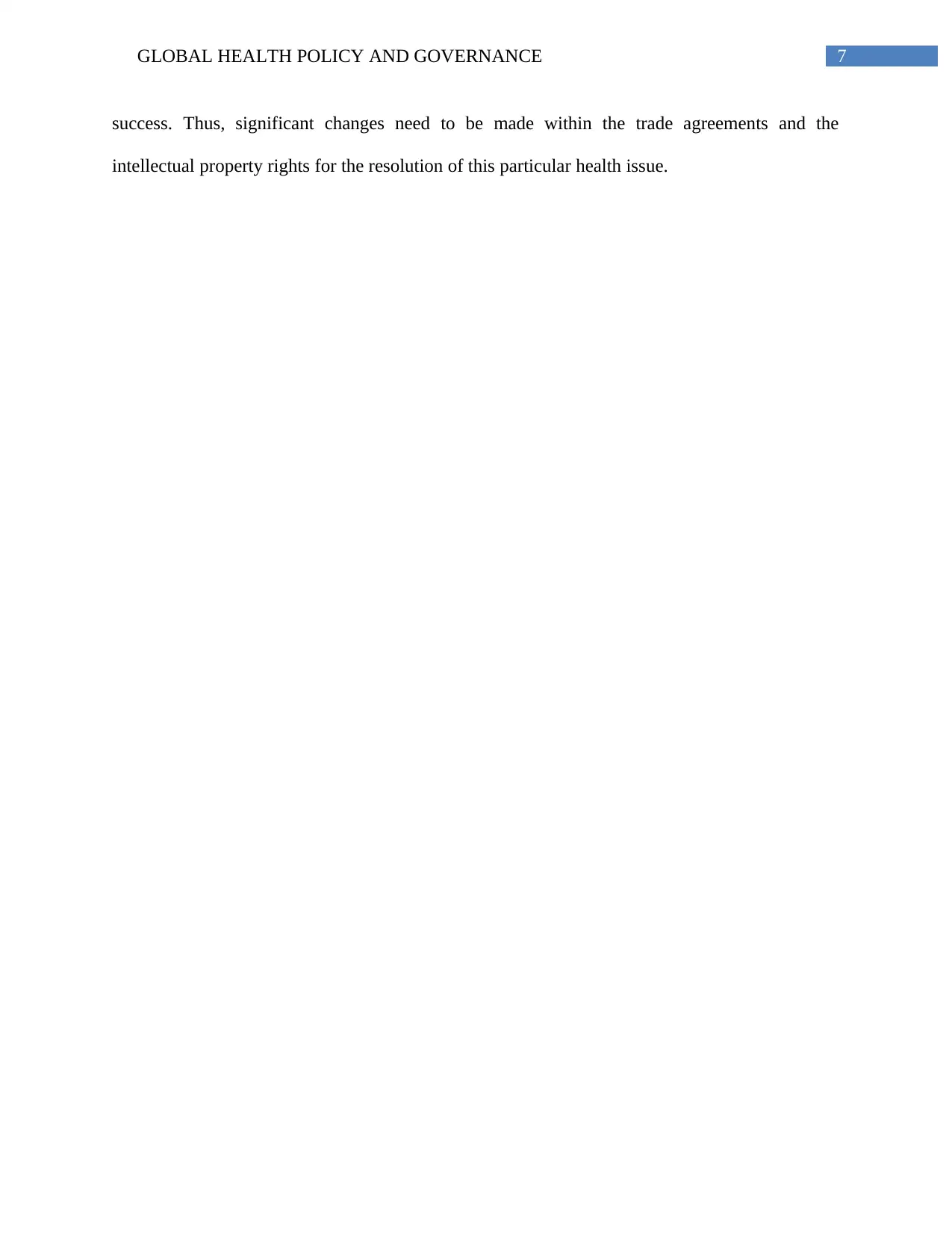
7GLOBAL HEALTH POLICY AND GOVERNANCE
success. Thus, significant changes need to be made within the trade agreements and the
intellectual property rights for the resolution of this particular health issue.
success. Thus, significant changes need to be made within the trade agreements and the
intellectual property rights for the resolution of this particular health issue.
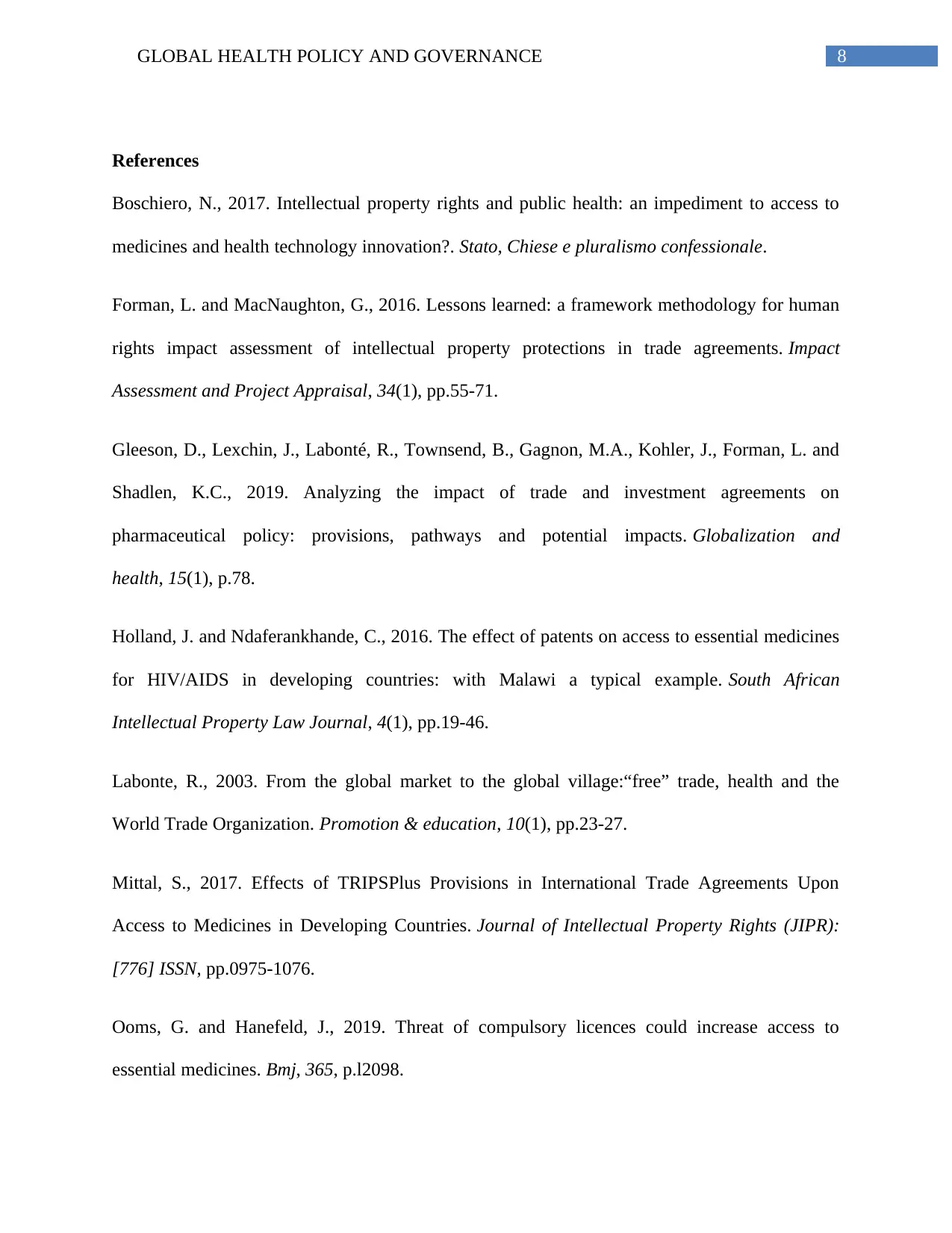
8GLOBAL HEALTH POLICY AND GOVERNANCE
References
Boschiero, N., 2017. Intellectual property rights and public health: an impediment to access to
medicines and health technology innovation?. Stato, Chiese e pluralismo confessionale.
Forman, L. and MacNaughton, G., 2016. Lessons learned: a framework methodology for human
rights impact assessment of intellectual property protections in trade agreements. Impact
Assessment and Project Appraisal, 34(1), pp.55-71.
Gleeson, D., Lexchin, J., Labonté, R., Townsend, B., Gagnon, M.A., Kohler, J., Forman, L. and
Shadlen, K.C., 2019. Analyzing the impact of trade and investment agreements on
pharmaceutical policy: provisions, pathways and potential impacts. Globalization and
health, 15(1), p.78.
Holland, J. and Ndaferankhande, C., 2016. The effect of patents on access to essential medicines
for HIV/AIDS in developing countries: with Malawi a typical example. South African
Intellectual Property Law Journal, 4(1), pp.19-46.
Labonte, R., 2003. From the global market to the global village:“free” trade, health and the
World Trade Organization. Promotion & education, 10(1), pp.23-27.
Mittal, S., 2017. Effects of TRIPSPlus Provisions in International Trade Agreements Upon
Access to Medicines in Developing Countries. Journal of Intellectual Property Rights (JIPR):
[776] ISSN, pp.0975-1076.
Ooms, G. and Hanefeld, J., 2019. Threat of compulsory licences could increase access to
essential medicines. Bmj, 365, p.l2098.
References
Boschiero, N., 2017. Intellectual property rights and public health: an impediment to access to
medicines and health technology innovation?. Stato, Chiese e pluralismo confessionale.
Forman, L. and MacNaughton, G., 2016. Lessons learned: a framework methodology for human
rights impact assessment of intellectual property protections in trade agreements. Impact
Assessment and Project Appraisal, 34(1), pp.55-71.
Gleeson, D., Lexchin, J., Labonté, R., Townsend, B., Gagnon, M.A., Kohler, J., Forman, L. and
Shadlen, K.C., 2019. Analyzing the impact of trade and investment agreements on
pharmaceutical policy: provisions, pathways and potential impacts. Globalization and
health, 15(1), p.78.
Holland, J. and Ndaferankhande, C., 2016. The effect of patents on access to essential medicines
for HIV/AIDS in developing countries: with Malawi a typical example. South African
Intellectual Property Law Journal, 4(1), pp.19-46.
Labonte, R., 2003. From the global market to the global village:“free” trade, health and the
World Trade Organization. Promotion & education, 10(1), pp.23-27.
Mittal, S., 2017. Effects of TRIPSPlus Provisions in International Trade Agreements Upon
Access to Medicines in Developing Countries. Journal of Intellectual Property Rights (JIPR):
[776] ISSN, pp.0975-1076.
Ooms, G. and Hanefeld, J., 2019. Threat of compulsory licences could increase access to
essential medicines. Bmj, 365, p.l2098.
⊘ This is a preview!⊘
Do you want full access?
Subscribe today to unlock all pages.

Trusted by 1+ million students worldwide
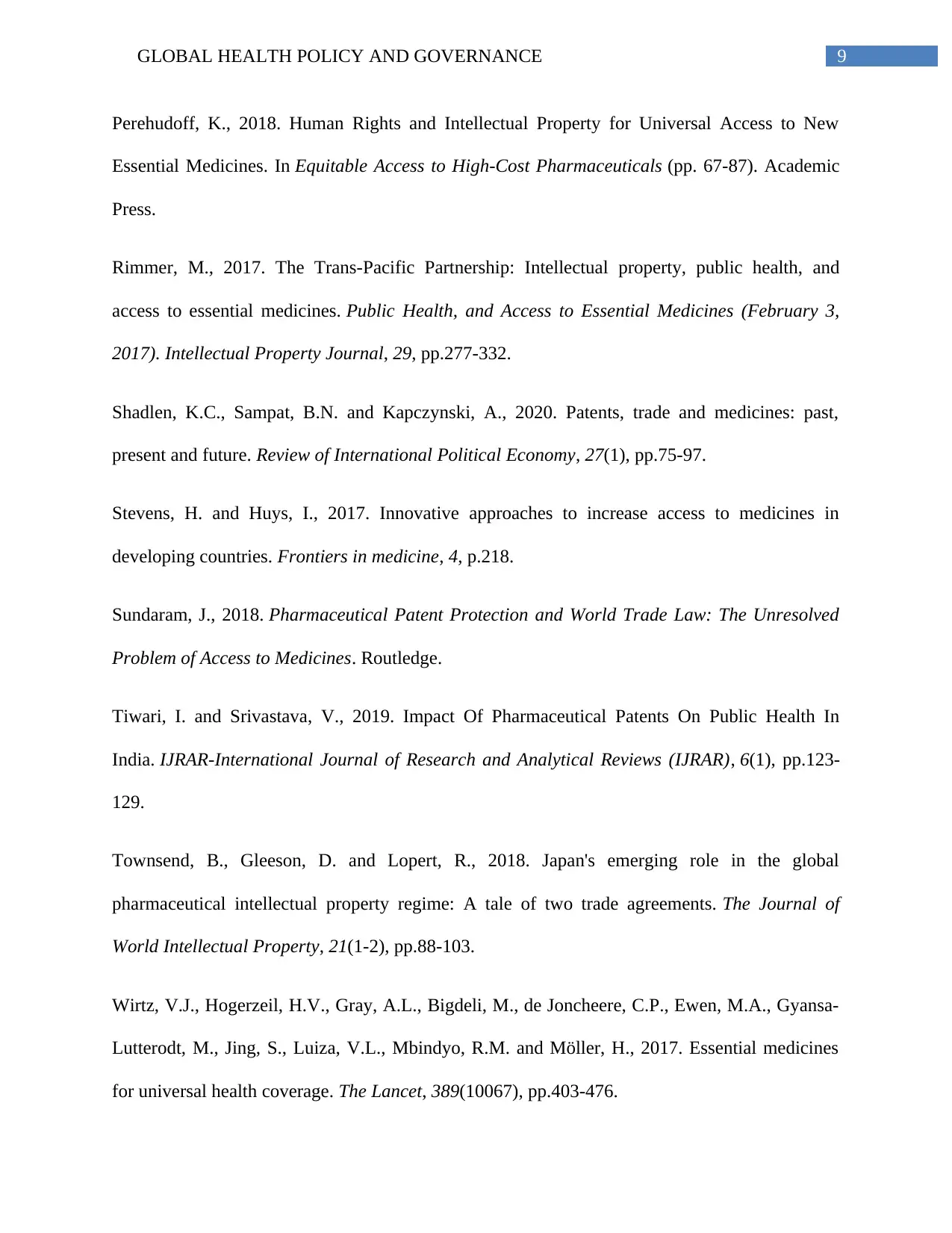
9GLOBAL HEALTH POLICY AND GOVERNANCE
Perehudoff, K., 2018. Human Rights and Intellectual Property for Universal Access to New
Essential Medicines. In Equitable Access to High-Cost Pharmaceuticals (pp. 67-87). Academic
Press.
Rimmer, M., 2017. The Trans-Pacific Partnership: Intellectual property, public health, and
access to essential medicines. Public Health, and Access to Essential Medicines (February 3,
2017). Intellectual Property Journal, 29, pp.277-332.
Shadlen, K.C., Sampat, B.N. and Kapczynski, A., 2020. Patents, trade and medicines: past,
present and future. Review of International Political Economy, 27(1), pp.75-97.
Stevens, H. and Huys, I., 2017. Innovative approaches to increase access to medicines in
developing countries. Frontiers in medicine, 4, p.218.
Sundaram, J., 2018. Pharmaceutical Patent Protection and World Trade Law: The Unresolved
Problem of Access to Medicines. Routledge.
Tiwari, I. and Srivastava, V., 2019. Impact Of Pharmaceutical Patents On Public Health In
India. IJRAR-International Journal of Research and Analytical Reviews (IJRAR), 6(1), pp.123-
129.
Townsend, B., Gleeson, D. and Lopert, R., 2018. Japan's emerging role in the global
pharmaceutical intellectual property regime: A tale of two trade agreements. The Journal of
World Intellectual Property, 21(1-2), pp.88-103.
Wirtz, V.J., Hogerzeil, H.V., Gray, A.L., Bigdeli, M., de Joncheere, C.P., Ewen, M.A., Gyansa-
Lutterodt, M., Jing, S., Luiza, V.L., Mbindyo, R.M. and Möller, H., 2017. Essential medicines
for universal health coverage. The Lancet, 389(10067), pp.403-476.
Perehudoff, K., 2018. Human Rights and Intellectual Property for Universal Access to New
Essential Medicines. In Equitable Access to High-Cost Pharmaceuticals (pp. 67-87). Academic
Press.
Rimmer, M., 2017. The Trans-Pacific Partnership: Intellectual property, public health, and
access to essential medicines. Public Health, and Access to Essential Medicines (February 3,
2017). Intellectual Property Journal, 29, pp.277-332.
Shadlen, K.C., Sampat, B.N. and Kapczynski, A., 2020. Patents, trade and medicines: past,
present and future. Review of International Political Economy, 27(1), pp.75-97.
Stevens, H. and Huys, I., 2017. Innovative approaches to increase access to medicines in
developing countries. Frontiers in medicine, 4, p.218.
Sundaram, J., 2018. Pharmaceutical Patent Protection and World Trade Law: The Unresolved
Problem of Access to Medicines. Routledge.
Tiwari, I. and Srivastava, V., 2019. Impact Of Pharmaceutical Patents On Public Health In
India. IJRAR-International Journal of Research and Analytical Reviews (IJRAR), 6(1), pp.123-
129.
Townsend, B., Gleeson, D. and Lopert, R., 2018. Japan's emerging role in the global
pharmaceutical intellectual property regime: A tale of two trade agreements. The Journal of
World Intellectual Property, 21(1-2), pp.88-103.
Wirtz, V.J., Hogerzeil, H.V., Gray, A.L., Bigdeli, M., de Joncheere, C.P., Ewen, M.A., Gyansa-
Lutterodt, M., Jing, S., Luiza, V.L., Mbindyo, R.M. and Möller, H., 2017. Essential medicines
for universal health coverage. The Lancet, 389(10067), pp.403-476.
Paraphrase This Document
Need a fresh take? Get an instant paraphrase of this document with our AI Paraphraser
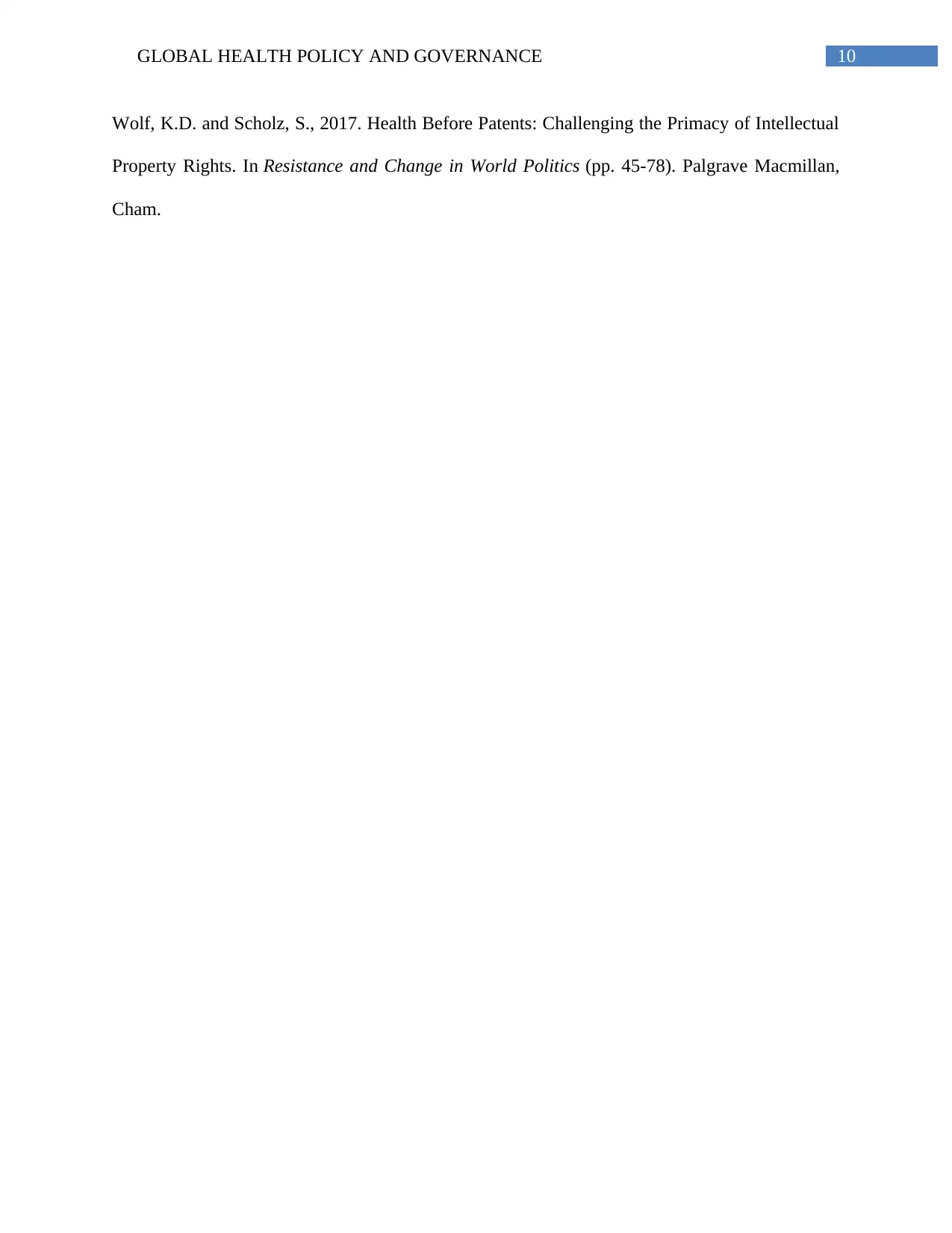
10GLOBAL HEALTH POLICY AND GOVERNANCE
Wolf, K.D. and Scholz, S., 2017. Health Before Patents: Challenging the Primacy of Intellectual
Property Rights. In Resistance and Change in World Politics (pp. 45-78). Palgrave Macmillan,
Cham.
Wolf, K.D. and Scholz, S., 2017. Health Before Patents: Challenging the Primacy of Intellectual
Property Rights. In Resistance and Change in World Politics (pp. 45-78). Palgrave Macmillan,
Cham.
1 out of 11
Related Documents
Your All-in-One AI-Powered Toolkit for Academic Success.
+13062052269
info@desklib.com
Available 24*7 on WhatsApp / Email
![[object Object]](/_next/static/media/star-bottom.7253800d.svg)
Unlock your academic potential
Copyright © 2020–2026 A2Z Services. All Rights Reserved. Developed and managed by ZUCOL.





